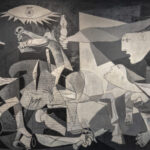It Holds Up: In Writing – ‘Tabula Rasa’
Posted: by The Alt Editing Staff

The train was rushing toward us, and Andrew wasn’t moving. I was the first to step off the tracks. Collin followed. Jonathan, grinning devilishly, stayed a few seconds longer–but Andrew wasn’t moving. He stared down the train unblinkingly, unphased by the bellowing horn warning him to step aside. The three of us shouted to him, pleading to no avail. I screamed his name, shouting so loud that my vision blurred and Andrew became a silhouette, an outline against shadow, the train barrelling straight toward him, unable to stop before it was too late.
I know how it looks, but this isn’t a scene from a coming-of-age movie. It’s a memory, a real moment from July of 2012–a destructive act by a close friend concluding a week of increasingly dangerous behavior. We were teenagers on our first tour, and it was a defining moment for all of us: a near-death experience at a time when we felt untouchable. It would also come to be the inspiration for “Some Things I Just Can’t Handle” by Pennsylvania emo band In Writing, the closing track on their debut album Tabula Rasa, which turns ten today.
Tabula Rasa is a true gem. It’s a little record with a big heart and remains a beloved classic by those who know it, though not many do: its impact was huge regionally but its reach was limited, and its legacy has been lost to time. It’s a stellar effort that captures a thriving community at an irreplicable moment, and to really honor this milestone and understand what made this record so special, we have to understand what that moment looked like.
Autumn of 2012 was a transitional time for this sort of guitar music, and Pennsylvania felt like the heart of it. Snowing and Algernon Cadwallader had broken up, but their influence was seeping into basements all over the state. Title Fight had just released Floral Green to critical acclaim, spawning hundreds of imitators overnight. A small Philadelphia band called Modern Baseball had unceremoniously dropped their debut album, and local buzz was starting to grow. Nationally, the seeds were planted for what would eventually be known as the “emo revival”–but no one called it that at the time, and we were still a long way from some of the era’s most defining releases.
It was a transient moment and the static was in the air, a tangible and electric current that marked a changing landscape. Deep within the woods of the Pocono Mountains, four high school kids were making it their own.
In Writing was formed by vocalists/guitarists Jonathan Arocho and Toni Pennello, drummer Conor McKeown, and bassist Angel Gonzalez in 2012 after the dissolution of their more juvenile bands. They came at a time when interest in our local scene was growing, thanks to very formative house shows thrown by the bands a few years older than us. By 2012, most of these bands had broken up and the usual houses stopped throwing shows. A new venue had opened in Stroudsburg, and new houses would host the occasional regional or touring band, but there was an increasing demand for new local music. We were hungry for something that felt like it belonged to us, something to prove our town had more to offer than tourist destinations.
When In Writing played their first show on January 2, 2013, the demand was met and the hunger was satiated.
We’ve all heard a song in the midst of a personal struggle and felt like it could be written about the very thing we’re going through. With In Writing, this was real: eruptive reflections on people who had let down their community, fueled by the kind of bitter disappointment you can only feel at seventeen. Consequently, the pile-ons and sing-alongs weren’t just emotional expressions–they became legitimate catharsis, collective healing through pointed fingers and locked arms, a demonstration of what the songs’ subjects were leaving behind.
But to put the credit on the context is to take it from the songs, which are as memorable as anything from that era. They had all the genre’s cornerstones–intricate riffing in open tunings, driving, jangly hooks, and scrappy charisma–and were delivered with a sophistication not often seen in high schoolers. Consider the urgent and anthemic thrash of “Sunny Side,” the jazzy dance-punk of “Rusting,” or the ethereal surrender of the penultimate track. “New Year,” a pining and broken-hearted reflection on the titular holiday, is due its rightful place in the emo canon with others of its kind, placed firmly between “Skipping Stone” and “This Must Be My Exit” chronologically.
If there was any song that epitomized this moment in our scene, it’s “Some Things I Just Can’t Handle,” the aforementioned closing track, written about our wayward friend at the height of his recklessness. Its explosive chorus begged us to not “trade something important for something immediate,” and every live show saw our collective despair coalesce at the song’s bridge, a throat-ripping crescendo whose lyrics offered the reassurance we all needed: “You’re okay. You’ll grow up someday.”
I watched Andrew step off the tracks at the last possible second in July of 2012. He almost didn’t. The inclination toward destruction was palpable, the only compass guiding him. Now, I understand it could have been any one of us. We were drawn to this music because we were troubled kids from troubled homes, stuck in a small mountain town we feared we’d never leave. We screamed the words to that song at the end of every In Writing set, arm in arm, because we needed them to be true.
In Writing disbanded in April of 2016, just a few months after releasing their immaculate follow-up, While You Were Away. The break up coincided with a mass exodus from the mountain–a large group of us moved to Wilkes-Barre together while others left for college, for different states, for different lives altogether. Time creeps ever forward, and the moments that feel central to our identities fade and become memories, stories to share with new friends in new places. It’s a bittersweet reckoning, the gift of a blank slate at the cost of all that came before it.
For so long, Tabula Rasa represented the healing power of community and friendship. A decade later, it feels like a cautionary tale about their fragility. The people and places we hold most dear are fleeting. Every moment has an expiration date, and you can’t always predict when it’ll come. Not everyone dodged the train. Those who did have to keep moving.
So we did–and life looks different now. When Jonathan isn’t busy with his three beautiful children, he and Conor play in Head Spell. Toni and Fabrizio (who replaced Angel in 2015) played in Spur, and have since formed Glass Mask. Angel has since shifted his creative focus to visual art and is working on a comic, and Andrew–the wayward friend whose destructive streak was the foundation for so much of this–is a father and business owner, now sober for over five years.
You’ll grow up someday.
Toni Pennello: “What made it really special at the time was how many kids were riding for the local bands they liked. I remember playing a packed show in Jon’s basement, looking around and realizing that everyone in the room was about my age. It dawned on me that after we graduated and moved away, it probably wouldn’t exist the way it did in that moment. The thought was depressing then, but now I understand that it was special in part because it was ephemeral.”
Angel Gonzalez: “I could not have been luckier to learn from these individuals. The band became my family, and that’s what makes Tabula Rasa so special. It’s a record of a time where we made magic happen, even if it was just once. What people hear there is us – the full spectrum of four young kids living in the Poconos, dying to be something more.”
Conor Mckeown: “It felt like a place in time where we had the privilege to just write and focus on music. It was going on during what now feels like the tail end of a scene and a group of people keeping the house shows alive. It was definitely something special that not only brought the band together, but the community as a whole while we had it.”
Jonathan Arocho: “There were a lot of new beginnings for me and the members of the band during that time. It was my last year of high school and I just remember wanting to create something that was the most meaningful to me, that could capture the essence of what I felt during that time. I’m happy to say I was able to be a part of something that resonated with as many people as it did.”
—
James Jaskolka | @garagesalesaturday
The Alternative is ad-free and 100% supported by our readers. If you’d like to help us produce more content and promote more great new music, please consider donating to our Patreon page, which also allows you to receive sweet perks like free albums and The Alternative merch.










